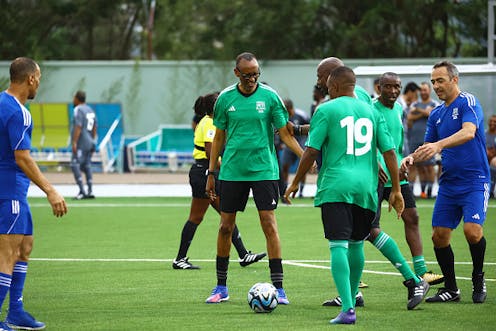
In politics, soft power is a persuasive approach to international relations. A leader can use soft power by exerting economic, cultural or reputational influence.
His hard power aside, soft power is something Rwanda’s President Paul Kagame possesses in spades.
One of Africa’s long serving leaders, Kagame wields soft power to deal with international criticism of his authoritarianism and human rights abuses.
As a political scientist I have been tracking developments in Africa’s governance and democracy, integration and peace-keeping. In my view, the recent Paul Rusesabagina saga was the first misstep that seriously dented Kagame’s image and influence in the west, but will likely prove only a hiccup in the long term.
Rwanda organised the extraordinary rendition of Paul Rusesabagina in August 2020. Rusesabagina, now a permanent US resident and a critic of Kagame, is known internationally for a role in saving a thousand Tutsis from genocidal gangs. His actions were portrayed in a Hollywood film, Hotel Rwanda.
He was abducted in Dubai and flown to face trial in Kigali on charges of supporting insurgents. The Rwandan court eventually sentenced him to 25 years in prison.
Rusesabagina’s trial and jailing caused an outcry in the west – perhaps more than all previous actions, such as assassinations, of the Rwandan government.
The US government spent several months in negotiations with Kagame to get Rusesabagina released in a grant of clemency, and it strained relations.
The source of Kagame’s soft power
Kagame’s phenomenal power – both soft and hard – has its origin in the horrific genocide of 1994 when about 800,000 Tutsi and moderate Hutu were massacred within 100 days in Rwanda. Kagame’s Rwandan Patriotic Front overthrew the regime responsible for the genocide in three months. Ever since, he has enjoyed in the west the sort of deference accorded to Israeli governments, also viewed as the heir of survivors of genocide.
This is not the only unique feature of Kagame’s rule. Many African presidents-for-life are notorious for self-enrichment. But Kagame focuses on accumulating wealth for the ruling party. The Rwandan Patriotic Front’s holding company, Crystal Ventures, dominates the Rwandan stock exchange. The party is also efficient at appealing to the Tutsi diaspora around the world for donations.
Rwanda also enjoys a glowing reputation in the west for its gender reforms. Rwanda’s parliament holds the world record for the percentage of MPs who are women, at 61%. Women also serve in record numbers as nonexecutive directors of Rwandan companies.
And at least two actions of Kagame won the admiration of pan-Africanists. His government imposed import duty on secondhand US clothes, to support Rwanda’s clothing manufacturers. When the US government punished Rwanda by removing it from the African Growth and Opportunity Act he stood his ground.
In 2016 the African Union (AU) appointed Kagame to head a commission to recommend reforms of the AU itself. These were all adopted, though few were implemented, beyond the uneven taking up of his report’s Kaberuka reform of AU annual dues: a 0.2% tax on imports.
How Kagame uses his soft power
Kagame has used this soft power to deploy hard power to accumulate more soft power. He dispatched 1,000 soldiers to the troubled gas-rich northern Cabo Delgado province of Mozambique in 2021. Though officially labelled as peacekeepers, the Rwandan troops also guarded the oil and gas installations belonging to French company Total Energies against an extremist Islamist insurgency. This was even before the Southern African Development Commmunity states could deploy their own peacemaking force there. Soon, a civil engineering subsidiary of Crystal Ventures won contracts for clearing and structural work on the Mozambique gas fields.
Similarly, 700 Rwandan troops are in Benin, helping that government to suppress a local extremist Islamist insurgency. All this peacekeeping effort wins allies for Rwanda’s government every time a vote needs to be taken in the African Union.
Kagame’s government has also shown other ways to project itself as an indispensable ally of western governments. He has pushed for partnerships with successful European football clubs as part of his efforts to market Rwanda to the world. Rwanda has also signed treaties with Israel and with the United Kingdom – both under right-wing governments – to allow for deportation of unwanted illegal immigrants to Kigali. These hapless undocumented migrants are given a few months’ allowance and accommodation, after which they are on their own.
These actions enabled Rwanda to be admitted to the Commonwealth although it was never a British colony.
Kagame vs critics
Criticism has surfaced in the west against Rwanda’s government. The most serious concern is its penchant for arresting opponents. It also carries out assassinations, reportedly, of opponents who have never taken up arms against the regime. Activists have “disappeared”.
The fact that the Rwanda government always got away with it inevitably led it to overreach.
The Rusesabagina abduction marked the first serious dent in western admiration for Kagame. Rwanda’s alleged backing for Congolese rebels the M23 could sooner or later cause another rift with the west, and concern among AU friends of the Democratic Republic of Congo.
Kagame’s soft power has consequences for the lives of Rwandans. The assassination of opponents beyond Rwanda’s borders is a grim warning about human rights and governance in the great lakes region and the continent. Kagame will have to learn what the limits and consequences of soft power are.
Keith Gottschalk is a member of the African National Congress, but writes this article in his professional capacity as a political scientist.
This article was originally published on The Conversation. Read the original article.







